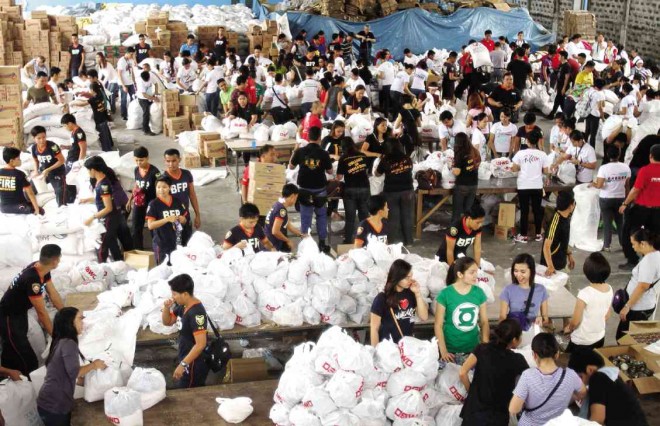
FULL HOUSE OF CHARITY There’s always room for more at the Pasay City warehouse of the Department of Social Welfare and Development, where thousands of volunteers have shown up to help pack relief goods for the victims of Supertyphoon “Yolanda.” JOAN BONDOC
A psychiatrist who has written numerous books on coping with tragedies has suggested that “role models” such as celebrities be flown in to areas struck by Supertyphoon “Yolanda” to console victims and give them the boost they need to rebuild their communities.
According to Dr. Lourdes Ignacio, a member of the World Association for Psychosocial Rehabilitation and the Philippine Psychiatric Association, “people who are admired” should be encouraged to “take the time to talk, hug and even entertain” the victims whose self-worth have plummeted as a result of the tragedy.
“What you have to [do is] put yourself in their shoes. [Think about] what will make your day and then take one day at a time. Because it’s already difficult to be awake for eight hours while nothing is happening in your life [and] … you also lost someone,” Ignacio, who coauthored the book “Ginhawa: Well-being in the Aftermath of Disasters,” told reporters at a forum the other day.
Asked which “role models” she was referring to, Ignacio replied: “Whoever can give you a sense of importance such as the people you admire,” including show biz celebrities.
Even letting the victims hold Christmas parties amid the devastation could help, she said, adding that this would provide them with an outlet for their emotions and give them the impression that they were just going about their daily lives.
Ignacio observed that “psychosocial processing” has so far taken a “back seat” in affected areas because the “major focus is really rescue, provision of housing, security, stability and sense of control.”
She added that even the first responders—relief workers, media practitioners, President Aquino and Cabinet officials, among others—should undergo a stress debriefing “somewhere along the way.”
According to her, some of these individuals could be “suffering” from trauma as a result of their exposure to the horrors of the tragedy.
Some of them, she said, were even victims of Yolanda.
“If we do not do anything about this, chronic stress will be in that particular person which unfortunately might develop in psychiatric symptoms if not attended to,” Ignacio added.
At the same time, she appealed to media to exercise “a high degree of sensitivity” in reporting about the situation in Yolanda-affected areas.
She said that the media should be conscious of the fact that among the victims were local government officials tasked with keeping order and taking care of their constituents.
“There has to be a high degree of sensitivity among those reporters reporting events; that you’re dealing with human beings, people who would also like to do what they have to do, assume leadership in the place but are so overwhelmed by the emotional shock which is carried upon by the weakness of their bodies, the confusion in their minds as to where to start…,” she explained.
“And if you can somehow take that attitude, the reporting will not be as negative in the field. Worse is that the effect is that they (local authorities) feel that they’re not doing anything,” she said.